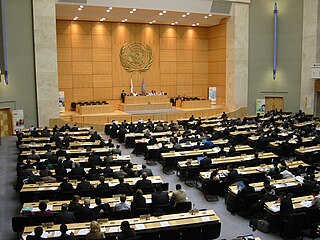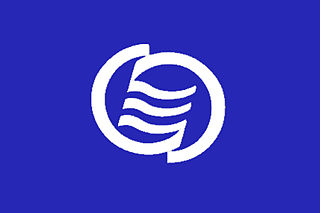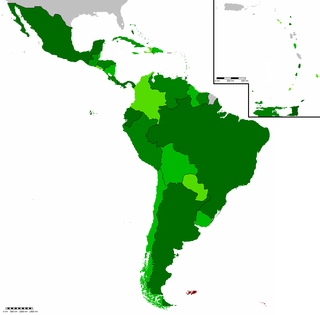
The United Nations Economic and Social Council is one of the six principal organs of the United Nations, responsible for coordinating the economic and social fields of the organization, specifically in regards to the fifteen specialised agencies, the eight functional commissions, and the five regional commissions under its jurisdiction.

The World Summit on the Information Society (WSIS) was a two-phase United Nations-sponsored summit on information, communication and, in broad terms, the information society that took place in 2003 in Geneva and in 2005 in Tunis. WSIS Forums have taken place periodically since then. One of the Summit's chief aims is to bridge the global digital divide separating rich countries from poor countries by increasing internet accessibility in the developing world. The conferences established 17 May as World Information Society Day.

LACNIC is the regional Internet registry for the Latin American and Caribbean regions.
The Association for Progressive Communications (APC) is an international network of organizations that was founded in 1990 to provide communication infrastructure, including Internet-based applications, to groups and individuals who work for peace, human rights, protection of the environment, and sustainability. Pioneering the use of ICTs for civil society, especially in developing countries, APC were often the first providers of Internet in their member countries.

The United Nations Information and Communication Technologies Task Force was a multi-stakeholder initiative associated with the United Nations which is "intended to lend a truly global dimension to the multitude of efforts to bridge the global digital divide, foster digital opportunity and thus firmly put ICT at the service of development for all".

The United Nations Economic Commission for Latin America and the Caribbean, known as ECLAC, UNECLAC or in Spanish and Portuguese CEPAL, is a United Nations regional commission to encourage economic cooperation. ECLAC includes 46 member States, and 14 associate members which are various non-independent territories, associated island countries and a commonwealth in the Caribbean. ECLAC publishes statistics covering the countries of the region and makes cooperative agreements with nonprofit institutions. The headquarters of ECLAC is in Santiago, Chile.

The Association of Caribbean States is an advisory association of nations centered on the Caribbean Basin. It was formed with the aim of promoting consultation, cooperation, and concerted action among all the countries of the Caribbean coastal area. The primary purpose of the ACS is to promote greater trade between the nations, enhance transportation, develop sustainable tourism, and facilitate greater and more effective responses to local natural disasters.
Armando Di Filippo is an Argentine economist, an economic science faculty member at the University of Rosario and Magíster in economic science at the University of Chile.

Alicia Isabel Adriana Bárcena Ibarra is a Mexican biologist currently serving as her country's Secretary of Foreign Affairs. She previously served as the Executive Secretary of the United Nations Economic Commission for Latin America and the Caribbean (ECLAC) from July 2008 to March 2022.

Pedro Vuskovic Bravo was a Chilean economist of Croatian descent, political figure, minister and author of the economic plan implemented by Salvador Allende during his government called the Vuskovic plan. His economic policies were used by economists Rudi Dornbusch and Sebastian Edwards to coin the term macroeconomic populism.
The Latin America and Caribbean Federation for Internet and Electronic Commerce was founded in March 1988 at a meeting held in Rio de Janeiro.

The Community of Latin American and Caribbean States (CELAC) is a regional bloc of Latin American and Caribbean states proposed on February 23, 2010, at the Rio Group–Caribbean Community Unity Summit, and created on December 3, 2011, in Caracas, Venezuela, with the signature of The Declaration of Caracas. It consists of 33 countries in Latin America and the Caribbean having five official languages.

The European Union – Latin America and Caribbean Foundation(EU–LAC Foundation) is an international organisation created in 2010 by the Heads of State and Government of the European Union (EU), Latin America and Caribbean (LAC) with the mission of strengthening and promoting the strategic partnership between both regions, improving its visibility and encouraging the participation of the respective civil societies.

Action for Climate Empowerment (ACE) is a term adopted by the United Nations Framework Convention on Climate Change (UNFCCC). It refers to Article 6 of the Convention's original text (1992), focusing on six priority areas: education, training, public awareness, public participation, public access to information, and international cooperation on these issues. The implementation of all six areas has been identified as the pivotal factor for everyone to understand and participate in solving the complex challenges presented by climate change. The importance of ACE is reflected in other international frameworks such as the Sustainable Development Goals ; the Global Action Programme for Education for Sustainable Development ; the Aarhus Convention (2011); the Escazú Agreement (2018) and the Bali Guidelines (2010).

Juan Alberto Fuentes Knight is a Guatemalan economist, politician, and non-profit official. Among other roles, he has served as Minister of Finance in Guatemala and as chairman of Oxfam International.
The I Latin American and Caribbean Summit on Integration and Development (CALC) was a summit of heads Latin American and Caribbean countries held on 16–17 December 2008 in Costa do Sauipe, Bahia, Brazil. It was organized at the initiative of the Lula administration with the goal of building cooperation mechanism with greater autonomy from the United States. Most heads of state from Latin America and the Caribbean states attended, with the exception of President of Colombia Álvaro Uribe and President of Peru Alan García. The summit finished with the signing of the Bahia Declaration, a common agenda establishing the following priorities: cooperation between mechanism of regional and subregional integration, the global financial crisis, energy, infrastructures, social development and eradication of hunger and poverty, food security, sustainable development, natural disasters, human rights promotion, migration, South–South cooperation and Latin America and Caribbean projection.

The Library of the Economic Commission for Latin America and the Caribbean was established in 1948 as part of the creation of the Economic Commission for Latin America and the Caribbean; this coincided with the inauguration of the Economic Commission for Latin America by the United Nations, in support of its mandate in the region. The Library has four branches: the Hernán Santa Cruz Library in Santiago, the Centro de Recursos de Información y Distribución de Documentos in México D.F., the Raúl Prebisch Library in Brasilia and the Caribbean Knowledge Management Centre in Port of Spain. These four form the ECLAC Library.

Youth's perspective is a concept promoted by youth movements, which seek to make visible the barriers youths face to participate, be taken into account, and exercise their rights due to the scheme of adult-centered oppression on which societies have been built in history. It seeks to insert the realities, problems, needs and opinions of young people into the public agenda from the voices of the youths, to promote intergenerational articulation and eradicate the discourses that legitimize the conditioning of rights.

The Regional Agreement on Access to Information, Public Participation and Justice in Environmental Matters in Latin America and the Caribbean, better known as the Escazú Agreement, is an international treaty signed by 25 Latin American and Caribbean nations concerning the rights of access to information about the environment, public participation in environmental decision-making, environmental justice, and a healthy and sustainable environment for current and future generations. The agreement is open to 33 countries in Latin America and the Caribbean. Of the 25 signatories, it has been ratified by fifteen: Antigua and Barbuda, Argentina, Belize, Bolivia, Chile, Ecuador, Grenada, Guyana, Mexico, Nicaragua, Panama, Saint Vincent and the Grenadines, Saint Kitts and Nevis, Saint Lucia, and Uruguay.
Emilio Luis Sempris Ceballos is a Panamanian politician and sustainability advocate. He served as Panama's minister of environment from 2017 to 2019. He also served as director general of the Water Center for the Humid Tropics of Latin America and the Caribbean (CATHALAC) between 2002 and 2012. In 2021, he was appointed as Distinguished Advisor of the Integrity Council for the Voluntary Carbon Market (ICVCM).












